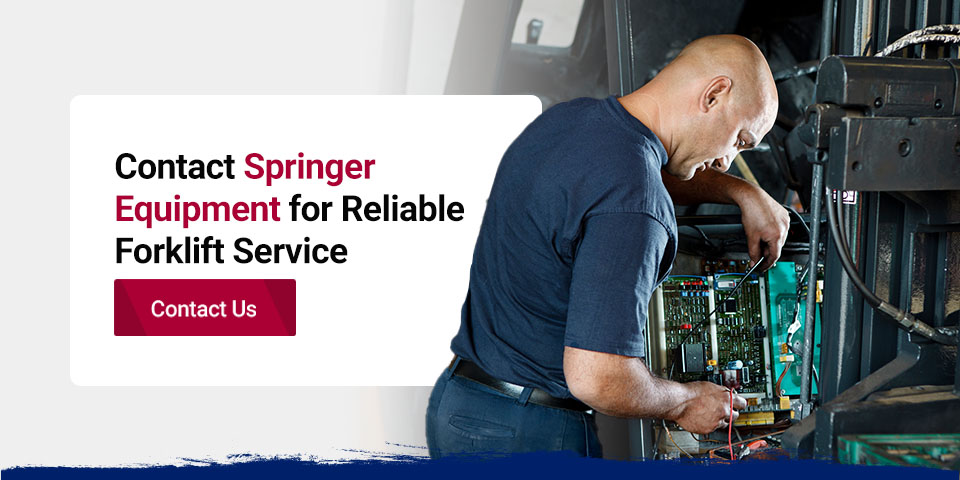If you own or operate a warehouse or another business that relies on material handling equipment, keeping your forklifts on the job and performing well is crucial to your company’s success.
Like any complex mechanical object with numerous parts and components, forklifts can break down occasionally, even with regular maintenance. Knowing how to fix a forklift efficiently is essential for preventing costly delays.
Typical Forklift Repairs and Solutions
You’re likely to encounter many of these common forklift repairs during their life span.
1. Not Starting
A forklift that won’t start is a frustrating problem that requires immediate attention. If the forklift is an internal combustion engine (ICE) model that runs on gasoline, diesel or propane, the issue could be as simple as an empty fuel tank that needs refilling. Electrical products may require a recharge or have a faulty battery.
Regular service is crucial for preventing these issues. It’s also helpful to remind operators and technicians to check the fuel supply or connect the battery to the charger between work shifts.
2. Overheating Engines
An overheated engine is one of the more common forklift hazards in diesel and other ICE units. Excessive heat causes the engine oil to burn faster. A broken or blocked radiator is often the cause — dirt and debris can accumulate over time and block the ports, causing a temperature increase and an eventual breakdown.
A regular check of the radiator and coolant is an essential step for preventing overheating. Cleaning it with fresh, clean water will remove caked-on dirt that can accumulate quickly, especially at outdoor job sites.
3. Worn or Damaged Tires
Forklifts can have air-filled or solid pneumatic tires ideally suited for outdoor environments like lumber yards or construction sites. They could also have cushion tires that deliver the best results on warehouse or manufacturing plant floors or smoother outdoor surfaces like concrete or asphalt.
As these tires must bear heavy loads for many hours a day, they can wear out quickly — or flatten in the case of air-filled versions — posing a significant safety risk. Operators and service technicians should check the tire condition frequently and replace them when necessary.
4. Steering Issues
When you consider that this equipment must lift and transport loads weighing thousands of pounds, a forklift that doesn’t handle or steer correctly can present a dangerous situation.
A low level of steering fluid transmission is a common cause of forklift maneuverability issues — an impeded flow will impact the operator’s ability to change directions on command. Improperly aligned wheels can also affect the equipment’s handling.
Operators should report steering issues to the maintenance team as soon as possible to prevent a potentially severe job site accident.
5. Mast Problems
Since the mast is responsible for raising and lowering a forklift’s load, keeping it in peak condition is paramount.
If the mast isn’t functioning properly, check the hydraulic fluid level and top it off if needed. If this step doesn’t resolve the issue, a chain replacement may be necessary. You should also elevate the mast to its full height and check each section for signs of rust, cracking, stretching, misalignment or other damage. Faulty switches or battery issues are also common mast performance issues.
6. Fluid Leaks
Check the space you park and store your forklift for signs of fresh fluids from the engine, radiator or hydraulic systems. A leak can result from something simple like a loose clamp or damaged hose that is easily detectable and correctable. Your preventive maintenance program should include regularly inspecting these vulnerable areas and promptly replacing worn or damaged parts.
7. Check Engine Light Glowing
Like private passenger cars and trucks, most newer forklift models have dashboard warning lights that flash or glow to indicate a potential problem. The specific issue may not be obvious — it typically requires an experienced service technician with the appropriate diagnostic tools to pinpoint the issue. This individual should also be familiar with the forklift make and model.
Because the check engine light often identifies unanticipated mechanical issues, it is difficult to implement specific preventive measures. The best way to keep it from coming on is to perform all the required equipment service steps recommended by the manufacturer.

Contact Springer Equipment for Reliable Forklift Service
At Springer Equipment, we can provide timely preventive maintenance and repair service via our LiftOne partners to keep your forklifts on the job and maximize their life span. Our factory-trained technicians work with equipment from all the leading manufacturers. After-hours service is available to minimize unproductive downtime. We also offer a wide selection of genuine parts and accessories for over 100 forklift brands.
Our extensive service area encompasses Alabama, Tennessee, Georgia and North and South Carolina. Contact our team for more information or to request a convenient service appointment today.

